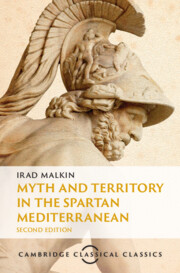Book contents
- Frontmatter
- Dedication
- Contents
- Maps
- Foreword
- Acknowledgements
- Abbreviations
- Note
- Introduction to the Second edition
- Introduction
- 1 The ‘colony of the Dorians’ and the Return of the Herakleidai
- 2 The Homeric king of Sparta: Menelaos in a Spartan Mediterranean
- 3 Spartan colonization in the Aegean and the Peloponnese
- 4 Taras: native hostility, territorial possession, and a new-ancient past
- 5 Foundation and territory: the cults of Apollo Karneios and Zeus Ammon
- 6 Myth and colonial territory: Libya
- 7 Promises unfulfilled: Dorieus between North Africa and Sicily
- 8 Myth and decolonization: Sparta’s colony at Herakleia Trachinia
- Bibliography
- Index
3 - Spartan colonization in the Aegean and the Peloponnese
Published online by Cambridge University Press: 31 October 2024
- Frontmatter
- Dedication
- Contents
- Maps
- Foreword
- Acknowledgements
- Abbreviations
- Note
- Introduction to the Second edition
- Introduction
- 1 The ‘colony of the Dorians’ and the Return of the Herakleidai
- 2 The Homeric king of Sparta: Menelaos in a Spartan Mediterranean
- 3 Spartan colonization in the Aegean and the Peloponnese
- 4 Taras: native hostility, territorial possession, and a new-ancient past
- 5 Foundation and territory: the cults of Apollo Karneios and Zeus Ammon
- 6 Myth and colonial territory: Libya
- 7 Promises unfulfilled: Dorieus between North Africa and Sicily
- 8 Myth and decolonization: Sparta’s colony at Herakleia Trachinia
- Bibliography
- Index
Summary
Fictive Spartan colonies were so numerous in antiquity that modern scholars rarely want to have anything to do with the question of their historicity. This approach may be safe but is not always wise. Whereas obvious inventions of Spartan kinship should be excluded, questions about the possibility of Spartan colonization are legitimate, at least for the Archaic and Classical periods. The fact, for example, that in the Hellenistic period the Jews claimed kinship with the Spartans or that cities in Asia Minor such as Selge, Alabanda, and Synnada considered themselves Spartan colonies, is an excellent topic for the study of late attitudes, but such patently fictive Spartan kinships teach us very little about the Archaic and Classical reputation of Sparta as the mother city of cities such as Melos or Thera. With the latter it is at least legitimate to examine the possible factual basis of this reputation. Whether such cities were once in fact Spartan colonies is irrelevant to the study of attitudes to Spartan colonization in the Archaic and Classical periods. If, however, there were a kernel of truth in a claim such as that of Melos that Sparta was its mother city, it might clarify how that claim came into being and especially how it was sustained.
Keywords
- Type
- Chapter
- Information
- Myth and Territory in the Spartan Mediterranean , pp. 67 - 114Publisher: Cambridge University PressPrint publication year: 2024

